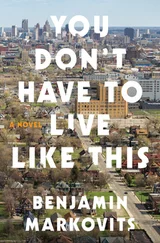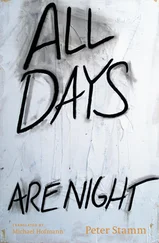The room was small, and you could tell that all possible economies had been made on it. There was a toilet, but no bath. The door to the shower was glass, and opened directly into the room, the washbasin was mounted on the wall just next to it. Tucked behind the head of the double bed was a narrow foldaway cot for a third person. Andreas imagined the German family spending the night in a room like this, the parents in the bed, the boy above them in the cot. He imagined them showering in the morning, the nakedness and the lack of space, the boy’s embarrassment as he treated his face with an acne preparation without being able to lock the bathroom door, the way he did at home. He imagined them traipsing through Paris, looking for the beauty of the city, and he asked himself whether they had found it. Their feet were hurting, they stopped for lunch in a restaurant with a German menu, where the waiter cheated them. Then there was an argument, because the parents wanted to go to a museum, and the boy didn’t. And then, when they asked him what he wanted to do, he couldn’t say anything.
Andreas was glad he had missed all that. He was glad he had never had a family. It was as near as he wanted to get, the times when his pupils went up to him at the end of class, and told him of their problems, and when he called the parents, and tried to mediate. Once or twice a pupil had even slept on his sofa, when home had become completely impossible.
He stood by the window and looked out at the many lanes of the highway. You couldn’t open the windows. They were soundproofed; only rarely you could hear the stifled sound of a car horn or an especially loud gear-change.
Andreas had been in his room since midday. He spent hours watching the traffic, sometimes the cars drove very close together, sometimes a little less, and then toward evening they solidified in columns, and now they were just starting to crawl forward again. The drivers had switched on their headlights. Night fell. They will drive like this forever, he thought, the traffic will never get any less. He thought about his death, or tried to think about it. But his life had been so uneventful that he couldn’t imagine his death. He could only see himself lying in some hospital somewhere. And then the road again, the numberless cars. God Almighty has counted them up, to be sure that none is missing . The stars, the grains of sand, the sheep in His herd. Even when he was a child, Andreas hadn’t believed in that.
Fear, fear wasn’t a thought. Fear seemed to come from outside. When Andreas thought of being sick he didn’t feel fear. He was desperate, confused, he struggled with himself, he reproached himself. Whereas fear came suddenly, without warning. It was like a darkening of his thoughts. Fear made it impossible to breathe, crushed his body until he felt ready to explode and break apart into a fine spray consisting of billions and billions of tiny droplets, spinning into the void. In the morning, the whole hotel stank of disinfectant. For breakfast there was coffee in plastic cups, the bread was soggy, and the orange juice watered.
Andreas left the hotel. The sky was gray, but it wasn’t cold. He strolled through the neighborhood. Not since he had first come to Paris, had he ever been out here. He had driven through St. Denis every day, but only ever seen the huge residential blocks from the train window, and in between them streets with dinky single-family homes in postage-stamp gardens, and further out, near the Stade de France, the new commercial district that had sprung up over the last few years.
Not far from the hotel was a cemetery, behind a high wall. Next to it was a funeral parlor, with a display of various sample gravestones in different shades of marble. In the window was a poster for their summer sale item, which was a stone in pale granite, and a stele with your own choice of top, all at a very low price. Andreas entered the cemetery. A man in a tracksuit came out of the toilet right beside the entrance, and walked past him. Andreas felt reminded of a joke he had once heard. It was something to do with death and tracksuits. He couldn’t remember how it went. A plane crash, maybe? He walked slowly between the rows of graves. There were some in which whole families were buried together. The lists of names were like family sagas, the names of the oldest were barely decipherable, and the newest had a brassy gleam. He stopped in front of one particularly ugly grave with heavy iron chains and a roof copied from some Greek temple. He read the names and dates. Between the Fifties and the Eighties no one in the family seemed to have died, but then in the space of a few years, there had been five deaths. There was a withered bunch of flowers on the grave, so there had to be descendants, people who remembered the dead. There was room on the slab for another one or two names anyway.
Andreas left the cemetery, and walked on through the quartier . He was astonished how clean and tidy everything looked. He read the names by the doorbells, foreign-sounding names, he couldn’t tell where they came from. Some sounded Arabic, others Eastern European or Asian. There was almost no one on the streets. There were no shops, only a community center with public baths and showers. In the windows of a kindergarten hung some colored drawings, a dozen terrifying android beings all with extra-large heads, that looked exactly the same.
At noon Andreas was back in the hotel. He paid the room for another night. He had bought a few magazines, and spent the afternoon lying on his bed, reading articles about the most scenic golf courses in the world, and about plastic surgery, and about film festivals. In a women’s magazine he found a list of a hundred tips for good sex. Try to look attractive at all times, comb your hair and freshen your lipstick. Small gifts spread happiness. Complimenting your partner’s physique will intensify your pleasure and his.
He fell asleep. When he awoke, it was nighttime. He felt restless, he knew he wouldn’t be able to sleep anymore. He left the hotel, and prowled through the neighborhood. After a while, he got to the new business centers that he had been able to see every day from the train. A few of them were only just completed, and not yet occupied. The glass facades had a blackish sheen in the light of the streetlamps. There were security cameras everywhere, but not a soul around.
On the way back, he passed the cemetery again, which was closed now. He wondered who would visit his grave, who would think of him when he was dead. Walter and Bettina, maybe. And apart from them? From time to time someone would read the inscription on his stone, and calculate the age at which he had died, and think he didn’t get to grow very old. And in twenty years’ time, Walter or one of his children would sign a form, and Andreas’s grave would be cleared, and there would be no more trace of him.
Andreas stayed at the hotel for a week. Every morning after breakfast, he paid for another night, and then he headed straight back upstairs. When the chambermaid came to do his room, he would wait out in the hall until she was finished. He slept a lot, and tried to read, and spent whole afternoons motionless on his bed, lost in vague drifts of thought. Sometimes he felt so weak, he was barely able to get up and put his clothes on, and at others he paced through the neighborhood, as though he might be able to escape his illness that way. Once or twice he thought of calling the doctor’s office because he could no longer stand the uncertainty, but then he put off the call until office hours were safely over.
On the day he was able to collect his car, he felt better. He got up early, showered, and packed his things. Then he called Delphine and asked if he could see her. She asked him where he was. She sounded sleepy. He said he could be with her in an hour. On the bus to Deuil he wrote a text message to Sylvie. She had sent him a message the day before, and asked him in her telegraphic style how he was feeling and what he was up to. He hadn’t replied. Now he wrote to say he was doing fine, and he wished her a nice summer. No sooner had he sent it off, than he got her reply. Sylvie wished him happy holidays and sent him a hug.
Читать дальше












